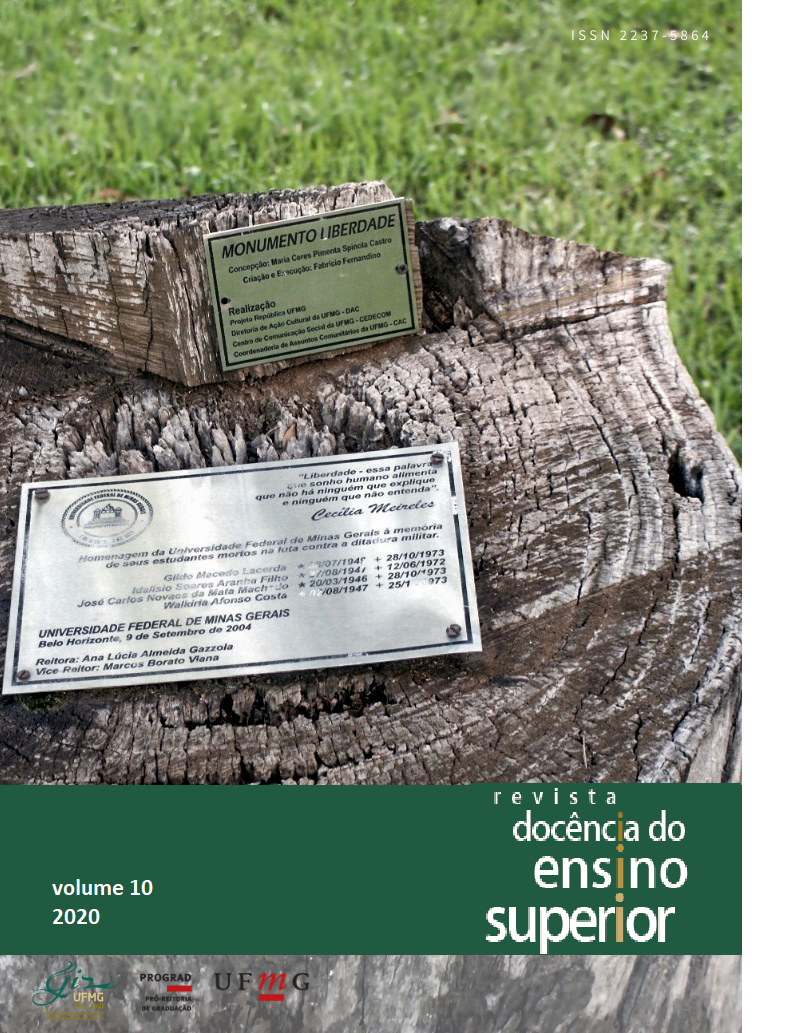Un chef en la educación superior
una mirada a la gamificación entreciativa en la educación textual de género
DOI:
https://doi.org/10.35699/2237-5864.2020.14942Palabras clave:
Enunciación, Gamificación, E-learningResumen
Este artículo presenta los resultados de un experimento y la viabilidad de las estrategias de Gamificación en VLE (entornos virtuales de aprendizaje) en la disciplina de producción de texto de una universidad federal. El objetivo principal de este estudio es formular una construcción teórico-metodológica aplicada al aprendizaje a distancia, basada en la aplicación de estrategias de Gamificación desde la perspectiva de la Teoría de la Enunciación de Emile Benveniste. Para alcanzar este potencial, la metodología propone el análisis en el aula (aula y educación a distancia) de una clase, realizada en el primer ciclo de 2019. El análisis de las clases y la retroalimentación de diecinueve estudiantes a través de una encuesta de satisfacción, sugieren que más de el 50% de los estudiantes califica la experiencia actual de gamificación como beneficiosa para sus antecedentes. Sin embargo, todavía hay aspectos por mejorar, como mantener la confidencialidad del estudiante, repensar el valor de las medallas y definir el perfil de los jugadores.
Descargas
Referencias
BENVENISTE, Émile. Problemas de Linguística Geral I. Campinas, SP: Pontes, 2005a.
BENVENISTE, Émile. Problemas de Linguística Geral II. Campinas, SP: Pontes, 2005b.
BUNCHBALL INC. Gamification 101: An Introduction to the use of Game Dynamics to Influence Behavior, 2010. Disponível em: http://jndglobal.com/wp-content/uploads/2011/05/gamification1011.pdf. Acesso em: 22 dez. 2018.
CAMPOS, Karlene do Socorro da Rocha; BENEDITO, Daniela Carnaúba. Gamificação no processo de ensino e aprendizagem de leitura em Língua Portuguesa. Revista Intercâmbio, São Paulo: LAEL/PUCSP, v. XXXVIII, p. 26-45, 2018.
CASTELLS, Manuel. A sociedade em rede. São Paulo: Paz e Terra, 2007.
FLORES, Valdir do Nascimento et al. (org.). Dicionário de Linguística da Enunciação. São Paulo: Contexto, 2009.
GEE, James Paul. Bons videogames e boa aprendizagem. Revista Perspectiva, Florianópolis, v. 27, n. 1, p. 167-178, jan./jun. 2009. Disponível em: https://periodicos.ufsc.br/index.php/perspectiva/article/view/2175-795X.2009v27n1p167/14515. Acesso em: 4 mai. 2019.
GUEDES, Paulo. Da redação à produção textual: o ensino da escrita. São Paulo: Parábola, 2009.
KAPP, Karl. The Gamification of Learning and Instruction: Game-based Methods and Strategies for Training and Education. San Francisco: Pfeiffer, 2012.
KOCH, Ingedore; ELIAS, Vanda. Ler e compreender os sentidos do texto. São Paulo: Editora Contexto, 2008.
MCGONIGAL, Jane. Realidade em jogo: por que os games nos tornam melhores e como eles podem mudar o mundo. Rio de Janeiro: Best Seller, 2012.
MOREIRA, Marco Antonio. A teoria da aprendizagem significativa e sua implementação em sala de aula. Brasília: Editora UnB, 2006.
MOTTA-ROTH, Désirée. Escrevendo na universidade: pedagogia de produção textual orientada para o contexto acadêmico. In: MOTTA-ROTH, Désirée. Redação acadêmica. São Paulo: Humanitas, 2018. p. 33-72.
OLIVEIRA, Arthur Marques de; SILVA, Silvana. A pertença do aluno à comunidade linguística da sala de aula: um estudo enunciativo das relações interlocutivas em uma turma de produção textual. Revista Eletrônica de Divulgação Científica em Língua Portuguesa, Linguística e Literatura Letra Magna, v. 14, n. 23, 2018/2. Disponível em: http://www.letramagna.com/artigos_23/artigo18_23.pdf. Acesso em: 21 jun. 2019.
PAULA, Francisco Leandro de. Gamificação no ensino de língua portuguesa: proposta de atividades com gêneros jornalísticos e midiáticos. 2016. 105 f. Dissertação (Mestrado em Letras) – Programa de Mestrado Profissional em Letras, Universidade Estadual do Rio Grande do Norte, Mossoró, 2016. Disponível em: http://www.uern.br/controledepaginas/profletras-mossoro-dissertacoes/arquivos/3621dissertacao_leandro_gamificacao.pdf. Acesso em: 3 nov. 2019.
SANTOS, Odair José Silva dos; OLIVEIRA, Arthur Marques de. Projeto Onomástica do Vale do Caí: do escrito ao virtual. In: XII ENCONTRO VIRTUAL DE DOCUMENTAÇÃO EM SOFTWARE LIVRE, 1., Anais [...], Belo Horizonte: Texto Livre, 2015. Disponível em: http://evidosol.textolivre.org/papers/2015/upload/22.pdf. Acesso em: 22 maio 2019.
SILVA, Silvana. O homem na língua: uma visão antropológica da enunciação para o ensino da escrita. 2013. 222 f. Tese (Doutorado em Estudos da Linguagem) – Instituto de Letras, Universidade Federal do Rio Grande do Sul, Porto Alegre, 2013. Disponível em: http://www.lume.ufrgs.br/handle/10183/90168. Acesso em: 22 maio 2018.
TOLOMEI, Bianca Vargas. A gamificação como estratégia de engajamento e motivação na educação. EaD Em Foco, Rio de Janeiro, v. 7, n. 2, p. 145-156, set. 2017. DOI: https://doi.org/10.18264/eadf.v7i2.440. Disponível em: https://www.researchgate.net/publication/319868333_A_Gamificacao_como_Estrategia_de_Engajamento_e_Motivacao_na_Educacao/fulltext/59bea6d9458515e9cfd2213d/319868333_A_Gamificacao_como_Estrategia_de_Engajamento_e_Motivacao_na_Educacao.pdf. Acesso em: 16 jan. 2019.
VYGOTSKY, Lev Semenovich. A formação social da mente: o desenvolvimento dos processos psicológicos. Organizado por Michael Cole et al. 7. ed. São Paulo: Martins Fontes, 2007.
Publicado
Número
Sección
Licencia
Los autores que publican en esta revista conservan los derechos de autor y otorgan a la revista el derecho de primera publicación, siendo la obra licenciada simultáneamente bajo la Creative Commons Attribution License, que permite compartir la obra con reconocimiento de autoría y publicación inicial en esta revista.
Los autores están autorizados a asumir contratos adicionales por separado, para la distribución no exclusiva de la versión del trabajo publicado en esta revista (por ejemplo, publicación en un repositorio institucional o como capítulo de libro), con reconocimiento de autoría y publicación inicial en esta revista.
Política de acceso abierto:
La Revista Docência do Ensino Superior es una revista de Acceso Abierto, lo que significa que todo el contenido está disponible de forma gratuita, sin costo para el usuario o su institución. Los usuarios pueden leer, descargar, copiar, distribuir, imprimir, buscar o vincular a los textos completos de los artículos, o utilizarlos para cualquier otro propósito legal, sin necesidad de obtener el permiso previo del editor o autor, siempre que respeten la licencia de uso. los Creative Commons utilizados por la revista. Esta definición de acceso abierto está en línea con la Iniciativa de Acceso Abierto de Budapest (BOAI).



























